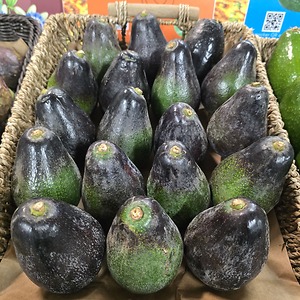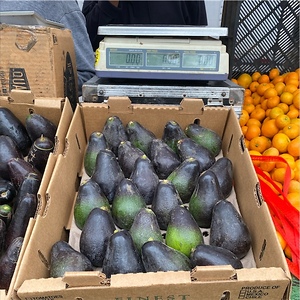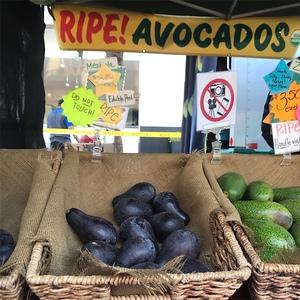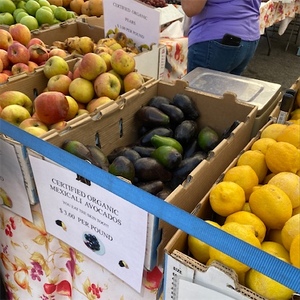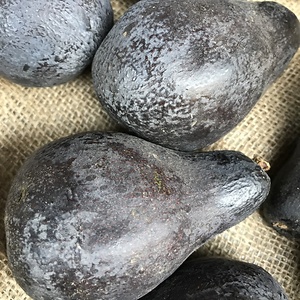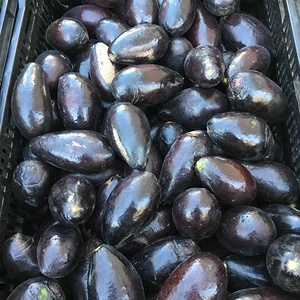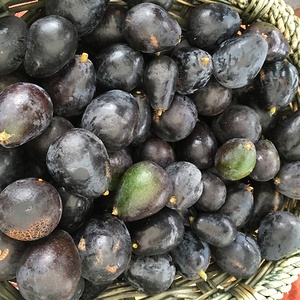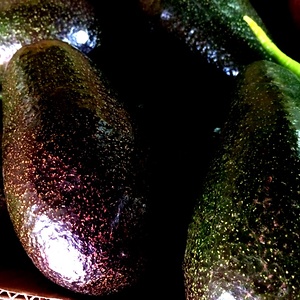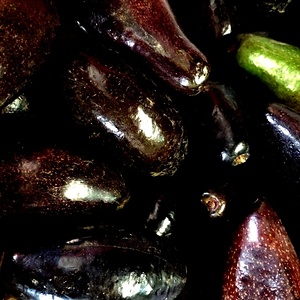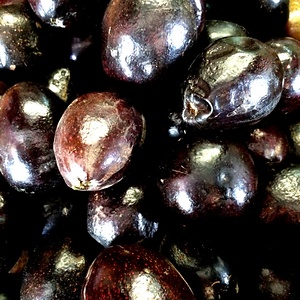

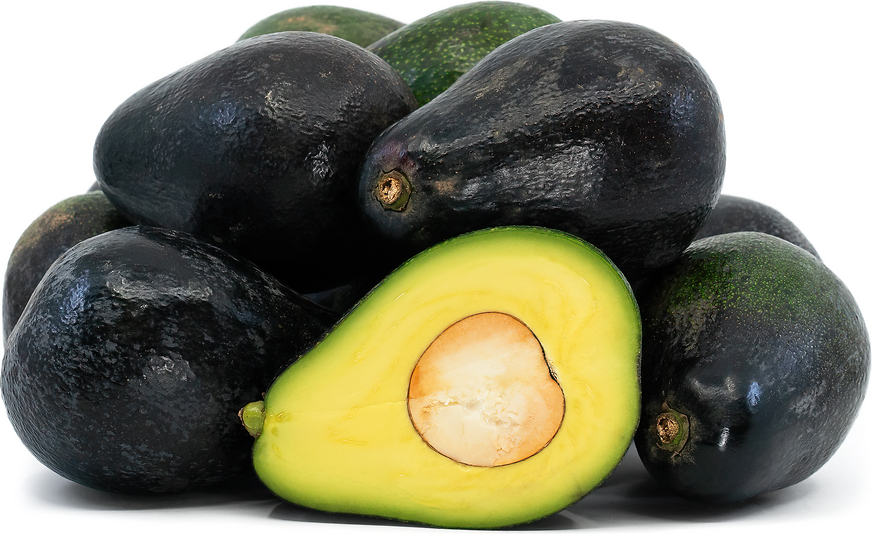
Mexicola Grande Avocados
Estimated Inventory, lb : 0
Description/Taste
Mexicola Grande avocados vary in size, depending on growing conditions, and average around 113 to 340 grams in weight at harvest. The variety has a slightly round, obovate, to ellipsoidal shape with a broad curved base and a tapered neck. The skin is very thin, smooth, glossy, and taut, ripening from green to black-purple hues. The skin is also delicate and can be easily damaged by wind and branch scratches. Underneath the surface, the flesh is dense, solid, and creamy, with a smooth, buttery texture. The flesh is dark green below the skin and lightens to a yellow hue around the central seed. The seed is large, and the husk around the seed tends to stick to the flesh. Mexicola Grande avocados have high moisture and moderate fat and oil content, creating a rich and nutty flavor. The variety is consumed once ripe and the skin is also edible, providing a subtle anise-like taste.
Seasons/Availability
Depending on the growing region, Mexicola Grande avocados are harvested in late summer through mid-winter. In Florida, the variety is typically picked between July and August, while in California, it is gathered from October through January.
Current Facts
Mexicola Grande avocados, botanically classified as Persea americana var. drymifolia, are a thin-skinned variety belonging to the Lauraceae family. The cultivar is a part of the Mexican avocado group, one of the three avocado races categorized by origin and physical characteristics. Mexicola Grande avocados were developed in California and are a hardy variety, notably showcasing cold and heat tolerance during cultivation. The variety is also fast-growing, producing large, spreading evergreen trees reaching up to nine meters in height. Since their release, Mexicola Grande avocados have expanded in cultivation to markets worldwide, but they are not extensively grown as a commercial variety. Mexicola Grande avocados have favorable characteristics for home gardens, but they also have a short season, often ripening at the same time and exhibiting fast fruit drop once ripe. This simultaneous ripening is not valued for broad-scale commercial production, localizing the variety to smaller quantities as a specialty avocado. Mexicola Grande avocados are known for their rich, earthy, and nutty flavor and are utilized in a wide array of fresh and cooked culinary preparations.
Nutritional Value
Mexicola avocados have not been extensively studied for their nutritional properties. Avocados, in general, are a source of fiber to regulate the digestive tract and minerals such as potassium, calcium, phosphorus, manganese, and magnesium. Potassium helps replenish electrolytes and balances fluids in the body, calcium and phosphorus support bones and teeth, manganese assists the body in producing energy, and magnesium controls daily nerve functions. In addition to minerals, avocados provide vitamins B6, B9, C, E, and K to strengthen the immune system, grow new cells, improve wound healing, and protect the cells against the damage caused by free radicals. Avocados also contain other nutrients, including niacin, thiamin, and riboflavin.
Applications
Mexicola Grande avocados have a rich, subtly nutty flavor suited for fresh and cooked preparations. The variety is distinct as it has very thin, edible skin, and once washed, the avocado can be bitten like an apple. Some consumers may discard the skin, but this is solely based on preference. Mexicola Grande avocados are savored for their creamy, buttery texture and are popularly mashed and added to guacamole. They are also tossed into salads, mixed into grain bowls, spread over toast, or added to sandwiches. Mexicola Grande avocados can be utilized in any preparation, calling for avocados, and have a neutral flavor complementing a wide array of cuisines. Try adding Mexicola Grande avocados to pasta, using them as a topping over tacos, or combining them as a thickener in baked goods. Beyond fresh preparations, Mexicola Grande avocados can be fried into wedges or flattened and baked into thin chips. Mexicola Grande avocados pair well with herbs such as cilantro, parsley, and dill, spices including cumin, paprika, and chili powder, and meats such as poultry, pork, beef, and turkey. Whole, unopened Mexicola Grande avocados should be left at room temperature to soften. Once ripe, the variety will keep for three days when stored in the refrigerator. Opened Mexicola Grande avocados should be sprinkled with lemon juice to prevent oxidization and wrapped in plastic to preserve the flesh’s coloring.
Ethnic/Cultural Info
Mexican-type avocados are known for more than just their fruits and have traditionally been used in Mexico since ancient times for their edible leaves. Varieties of Persea americana var. drymifolia have leaves that carry a distinct anise-like aroma, and this fragrance is imparted to culinary dishes. Avocado leaves have historically been regionally used in South and Central Mexico, and it is rumored that even the Aztecs and Mayans incorporated the leaves into medicinal tea and herbal infusions. In culinary preparations, avocado leaves are customarily cooked like bay leaves into black beans, soups, and stews. They are also layered as a bed for infusing flavor into roasted meats or wrapped around tamales for a unique aroma.
Geography/History
Mexicola Grande avocados are said to have been developed by the University of California Breeding Program in Riverside, California. Much of the variety’s history is unknown, and some sources hypothesize that the cultivar was a seedling of the Mexicola avocado variety, selected for its larger fruit size. Mexicola Grande avocados were initially known as 3-1-1 avocados. These avocados were eventually released to commercial growers, and the 3-1-1 variety was given its Mexicola Grande name by a nursery in California. Today, Mexicola Grande avocados thrive in tropical to subtropical climates and are known for their adaptability to grow in coastal and inland regions. The variety is planted in home gardens and cultivated through select growers throughout the United States, especially in California, Texas, and Florida. Mexicola Grande avocados are also present in the avocado collection at the South Coast Research and Extension Center in Irvine, California, a laboratory and preservation site connected to the University of California Riverside. Outside the United States, Mexicola Grande avocados are sold as a specialty variety through select nurseries worldwide, including Canada, New Zealand, and Australia.
Podcast



